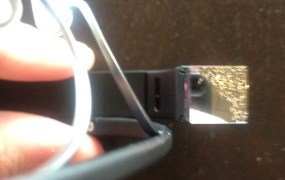Google Glass appears to be living up to its name. At least, the latter half of it.
The sexy prototype augmented reality devices are unexpectedly fragile, breaking down with some degree of regularity after just a few months of use.
[aditude-amp id="flyingcarpet" targeting='{"env":"staging","page_type":"article","post_id":814637,"post_type":"story","post_chan":"none","tags":null,"ai":false,"category":"none","all_categories":"business,mobile,","session":"B"}']“First, a few weeks ago the side of the prism started to delaminate,” Chris Barrett of PRserve told VentureBeat. “Then I wore Glass to Made in America festival two weekends ago and … the trackpad stopped working. You could still manually take photos, you could still use voice commands, but you couldn’t swipe.”
AI Weekly
The must-read newsletter for AI and Big Data industry written by Khari Johnson, Kyle Wiggers, and Seth Colaner.
Included with VentureBeat Insider and VentureBeat VIP memberships.
“The prism problem seems to be happening to a other people … and this was only after about 70 days of daily use,” Barrett told me.
The question is: How long should Google Glass last out of the box? What might be acceptable for the “Explorer” edition that’s in the hands of a few thousand people is one thing, but what consumers who buy them in the millions expect is probably quite another.
Google seems to be pretty good about replacements — you send Glass back to Google in a box they mail you, and they’ll send you a new pair if the damage wasn’t self-inflicted — but the problems also seem to be fairly widespread. A quick Twitter search for “Google Glass broken” brings up dozens of recent results.
Most of them, of course, are self-inflicted:
Well this isn’t good. Just pulled my Google Glass out of my bag to find this. Anybody broken theirs yet? Still works. pic.twitter.com/9UkFqR783b
— Tim Stevens (@Tim_Stevens) June 20, 2013
That appears to be at least partially the fault of an inadequate case, which one broken Glass victim called “a cowboy accessory of gray flannel that is closer to a hard-toed sock than to the Bulgari satin-lined jewelry box that would seem to suit fancy Google Glass.”
But Barrett’s delamination and trackpad failures — which he attempted to treat with rice, wondering if it had gotten wet — and Scoble’s prism disintegration suggest that there are other issues at play, including ones of product quality. I supposed that’s not a big shock, given that this is a prototype device, as a Google representative mentioned as he gave me this statement:
[aditude-amp id="medium1" targeting='{"env":"staging","page_type":"article","post_id":814637,"post_type":"story","post_chan":"none","tags":null,"ai":false,"category":"none","all_categories":"business,mobile,","session":"B"}']
“We’re in the Explorer phase of Glass’s development, so we’re eager to hear back from users about their experiences with both the hardware and software. The more feedback we get, the better we can make Glass ahead of our wider consumer launch in 2014.”
In addition, Google is replacing almost all nonfunctioning Glass devices for free — although the company will put a $1,500 hold on your credit card while you still have your old Glass in hand. The only occasions it won’t do that, the company says, is when the device was damaged deliberately or from lack of care.
Barrett agrees, saying that “Google customer service is top notch.”
However, Glassholes who don’t want to spend $1,500 on a new pair might want to invest in a more secure case than Google’s default version.
VentureBeat's mission is to be a digital town square for technical decision-makers to gain knowledge about transformative enterprise technology and transact. Learn More

